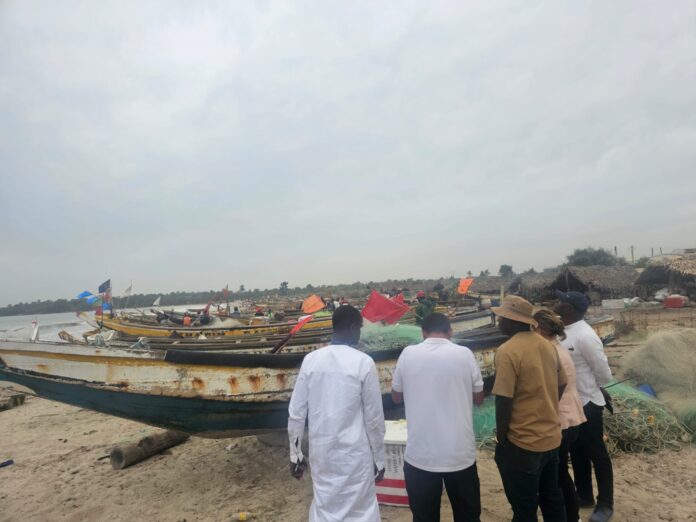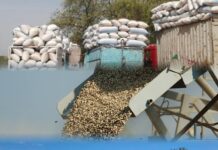By: Kebba Ansu Manneh
Concerns are mounting among Sanyang residents regarding the government’s transparency in the Deep Sea Port (DSP) project, particularly following recent statements made by Ousman Jobarteh, the Managing Director of the Gambia Ports Authority (GPA).
During an appearance on the local radio program “Coffee Time,” Jobarteh disclosed that the land acquisition for the DSP project would encompass significant areas, including the river lines of Sanyang Beach and properties along the Sanyang/Gunjur/Tujereng Coastal Road, which runs through the village.
This announcement has sparked apprehension among hundreds of residents, business owners, and community supporters, who feel that the authorities have not adequately consulted with affected families about property evaluations.
In a letter dated January 30, 2025, Lawyer Lamin J Darbo, the legal representative of the Sanyang community, requested that all facilities related to the DSP project be relocated to the sparsely settled Tourism Development Area (TDA) beyond the Hawaba old settlement, extending to the boundary between Sanyang and Tujereng.
The letter highlights concerns from residents, businesses, and historical sites and emphasizes the need for careful planning to avoid detrimental effects.
The correspondence sent to various government officials, including the Permanent Secretary of the Ministry of Works and Infrastructure and the National Assembly Select Committee on Monitoring and Implementation of Government Projects, calls for preserving the community’s cultural and historical landmarks.
Specific sites include the Hawaba area, Berewuleng Prayer Shrine, Fish Landing Site, the ecologically significant Mangrove Rejuvenation and Planting Area, and the Secret Beikefet River.
The Sanyang community, through its representatives, is advocating for protecting environmentally sensitive areas and eco-tourism facilities from potential impacts associated with the DSP project. The letter underscores the importance of balancing development initiatives with preserving local heritage and ecological integrity.
Additionally, they have raised concerns about the DSP master plan’s lack of transparency and the Concession Agreement’s implications for the Sanyang community.
This situation has caused significant distress and confusion within the community, as residents seek clarity on the project’s impact and safeguarding of their rights and properties. The Sanyang Village Development Committee and local leaders continue to advocate for a more transparent dialogue with the government regarding the DSP project.
Counsel Lamin J. Darbo raised significant concerns regarding the land earmarked for the Deep Sea Port (DSP) project. He stated that the approximately 100,000 hectares designated by the Gambia Ports Authority (GPA) appear disproportionate to public use criteria. He emphasized that the community feels distressed by the GPA’s method of informing families about property impacts through flyers, which has exacerbated anxiety and uncertainty regarding the project’s implications.
Darbo criticized the GPA for what he perceives as a lack of transparency, suggesting that residents have been kept uninformed about the broader details of the DSP master plan. He argued that the scale of the project indicates the involvement of appropriate consultancy services should have occurred, as it is improbable for such a large undertaking to progress without a comprehensive plan.
Furthermore, Counsel Darbo pointed out findings from his clients’ research, which compared the DSP’s land area to similar projects in the region. He noted that the Lekki Deep Seaport in Nigeria occupies around 90 hectares, serving a population of over 230 million. This raises questions about the rationale behind the GPA’s land allocation for a comparatively more minor nation like The Gambia. The community of Sanyang continues to seek clarity and assurance regarding their rights and the project’s potential impacts.
Counsel J. Darbo expressed the Sanyang community’s appreciation for the potential economic benefits of hosting the Deep Sea Port (DSP) project. However, he emphasized that the rights and concerns of the residents should be respected and prioritized throughout the development process.
Meanwhile, Saikou Camara, Secretary General and Legal Compliance Officer of the Sanyang UK Association (SUKA) echoed these sentiments, urging active participation from all Sanyang natives and residents in addressing the issues surrounding the GPA’s project management.
He reported that the Sanyang Diaspora has been working to obtain the master plan for the DSP, which contrasts with the GPA Managing Director’s assertion on a local program that approximately 100,000 hectares had been designated for the project.
Camara revealed that the concealed master plan reportedly includes four alternative maps, each indicating land requirements significantly less than the figure cited by the GPA Managing Director.
According to this information, the first alternative map indicates that 135 hectares would be needed for the DSP project. In contrast, the second, third, and fourth alternatives suggest requirements of 239.1 hectares, 242.02 hectares, and 1,298.262 hectares, respectively. This discrepancy has raised further concerns within the Sanyang community regarding the transparency and accuracy of the information provided by the GPA.
Saikou Camara outlined the Sanyang community’s collective demands regarding the Deep Sea Port (DSP) project. He emphasized that stakeholders believe the port should be located only between Howba and Tujereng village. They argue that the GPA’s proposal to acquire 100,000 hectares of land for the project is excessive and unnecessary.
Camara expressed a desire for transparency, stating that the community wants access to the full project documentation to understand its details, including potential concessions for the people of Sanyang. He requested that the GPA provide written assurances that local properties will not be affected and that meaningful consultations be conducted to address any outstanding concerns.
He also called for the GPA to confine all DSP activities within the designated area and avoid residential properties. The community is particularly concerned about preserving the old Howba settlement, cultural sites, the Fish Landing Centre (Tenda), and existing restaurants and beach bars along the coastline from Howba to Gunjur.
Aboulie Botto Gaye, Chairman of the Sanyang Village Development Committee (SVDC), also reiterated his committee’s position in response to the statements made by the GPA’s Managing Director, highlighting the need for respect and consideration for the community’s concerns as the project progresses.
In a recent audio message shared within the Sanyang Develop Funds group, the Chairman of the Sanyang Village Development Committee (SVDC) acknowledged the community’s concerns about the Deep Sea Port project. He indicated that the committee is actively noting these concerns and has planned a series of radio and media-related initiatives through a task force to address what he described as false claims made by the GPA’s Managing Director.
The Chairman urged the community to remain patient and pursue diplomatic and peaceful approaches to resolving the issues. He called for unity among the residents of Sanyang to ensure that their collective voice is heard when advocating for fairness and justice regarding the project.
Residents have expressed worries about the project’s potential impacts, highlighting that various local establishments—including restaurants, bars, hotels, fishing landing sites, fish mill factories, and women’s gardens—could be at risk. Many are concerned that over 400 residential compounds may also face displacement as the Government Concession Agreement with Albayrak, a Turkish company responsible for expanding the Banjul Sea Port and developing the Deep Sea Port in Sanyang, is implemented.






